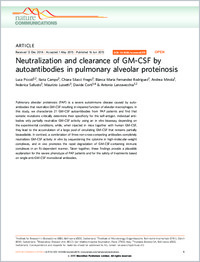Neutralization and clearance of GM-CSF by autoantibodies in pulmonary alveolar proteinosis
- Piccoli, Luca Institute for Research in Biomedicine (IRB), Faculty of Biomedical Sciences, Università della Svizzera italiana, Switzerland - Institute of Microbiology, Eidgenoössische Technische Hochschule (ETH), Zürich 8093, Switzerland
- Campo, Ilaria Respiratory Disease Unit, IRCCS San Matteo Hospital Foundation, Pavia 27100, Italy
- Fregni, Chiara Silacci Institute for Research in Biomedicine (IRB), Faculty of Biomedical Sciences, Università della Svizzera italiana, Switzerland
- Fernandez Rodriguez, Blanca Maria Institute for Research in Biomedicine (IRB), Faculty of Biomedical Sciences, Università della Svizzera italiana, Switzerland
- Minola, Andrea Institute for Research in Biomedicine (IRB), Faculty of Biomedical Sciences, Università della Svizzera italiana, Switzerland
- Sallusto, Federica Institute for Research in Biomedicine (IRB), Faculty of Biomedical Sciences, Università della Svizzera italiana, Switzerland
- Luisetti, Maurizio Respiratory Disease Unit, IRCCS San Matteo Hospital Foundation, Pavia 27100, Italy
- Corti, Davide Institute for Research in Biomedicine (IRB), Faculty of Biomedical Sciences, Università della Svizzera italiana, Switzerland - Humabs Biomed SA, Bellinzona 6500, Switzerland
- Lanzavecchia, Antonio Institute for Research in Biomedicine (IRB), Faculty of Biomedical Sciences, Università della Svizzera italiana, Switzerland - Institute of Microbiology, Eidgenoössische Technische Hochschule (ETH), Zürich 8093, Switzerland
-
16.06.2015
Published in:
- Nature communications. - 2015, vol. 6, p. 7375
English
Pulmonary alveolar proteinosis (PAP) is a severe autoimmune disease caused by autoantibodies that neutralize GM-CSF resulting in impaired function of alveolar macrophages. In this study, we characterize 21 GM-CSF autoantibodies from PAP patients and find that somatic mutations critically determine their specificity for the self-antigen. Individual antibodies only partially neutralize GM-CSF activity using an in vitro bioassay, depending on the experimental conditions, while, when injected in mice together with human GM- CSF, they lead to the accumulation of a large pool of circulating GM-CSF that remains partially bioavailable. In contrast, a combination of three non-cross-competing antibodies completely neutralizes GM-CSF activity in vitro by sequestering the cytokine in high-molecular-weight complexes, and in vivo promotes the rapid degradation of GM-CSF-containing immune complexes in an Fc-dependent manner. Taken together, these findings provide a plausible explanation for the severe phenotype of PAP patients and for the safety of treatments based on single anti-GM-CSF monoclonal antibodies.
- Language
-
- English
- Classification
- Medicine
- License
- Open access status
- gold
- Identifiers
-
- RERO DOC 326869
- DOI 10.1038/ncomms8375
- ARK ark:/12658/srd1319063
- Persistent URL
- https://n2t.net/ark:/12658/srd1319063
Statistics
Document views: 197
File downloads:
- Texte intégral: 489
